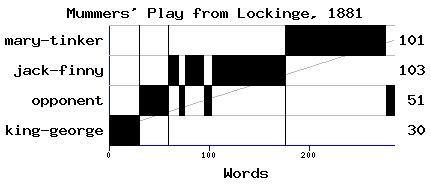Context:
| Location: |
Lockinge, Berkshire, England (SU4287) |
| Year: |
Perf. 1881 |
| Time of Occurrence: |
Christmas |
| Collective Name: |
Mummers |
|
Source:
Stuart Piggott
Berkshire Mummers' Plays and Other Folklore
Folklore,
1928, Vol.39, pp.271-277
|
Cast:
|
Text:
King George.-
"I am King George that noble knight,
I lost my blood in English fight,
By English fight it is the reason,
That makes me carry this awful weapon."
{He waves his wooden sword. Enter an Opponent (William Crane could not remember the name), and they fight. King George is wounded, and the Opponent calls out:}
[Opponent]
"Doctor, doctor, where be'st thee?
King George is wounded in the knee.
Doctor, doctor, play thy part,
King George is wounded in the heart.
Jack Finny!"
{Enter jack Finny.-}
[Jack Finny]
"Where's that scoundrel as calls me Jack Finny?"
Opponent.-
"Who be'st thee?"
Jack Finny.-
"My name is Mr. John Finny.
I can do as much as thee or any other man!"
Opponent.-
"What can thee do, then, Jack?"
Jack Finny.-
"I can cure the itch, the stitch, the stone,
The palsy and the gout,
Pains within and pains without.
The squollygrubs, the mollygrubs, [1]
Tight-looseness in the chest [2]
And wind in the knee.
And many other things which I shall never be able to mention to-night or any other night.
Just take one of my little Scotch pills, [3]
and if that don't cure you,
never believe me no more."
{He gives King George a pill. Enter Mary Tinker.}
Mary Tinker.-
"Rise up, King George, and fight again!
My name's Old Mary Tinker, [4]
Ale, wine, and strong beer drinker.
I told the landlord to his face,
The chimney corner was my place,
That's where I sat and dried my face,
While Jones's ale goes round, my boys.
I ate half-a-gallon loaf t'other day, without any bread, [5]
and near choked myself with the crumbles.
My name's Old Mother Alezeebub, [6]
Under my arm I carries my club,
And on my elbow I carries my bell,
And don't you think I cut a great swell?"
Opponent.-
"Yes, Mary, as big as mesel'!"
|
Notes:
Piggott's Introduction
I. Mummers' Play from Lockinge.
In the winter of 1926 I had the good fortune to obtain the following version of a Christmas Mummers' Play from an old man, William Crane, formerly of Lockinge, near Wantage, Berks, now living at West Challow. He had acted in the play when a young man, and had played all the parts in his time, and consequently could remember almost the whole of the performance. The last time it was played was before Lady Wantage in 1881.
Although short, the version presents many interesting points. In its present form it is late, i.e. a " compressed " version of the archetypical play. This is well shown by the fusion of characters; Jack Finny and the Doctor are one, while Mary Tinker is compounded of Mary (or Molly), Tom the Tinker, and Beelzebub. Also there is no prologue, and the usual crowd of quite superfluous characters at the end is omitted.
Piggott's Footnotes
1. Cf. " The molygrubs the polygrubs and those little rantantorious diseases " (Play from Kirtlington, Oxon, in The Folk-Lore Journal, vol. iv. (1886)). "The Mullygrubs and all other vainglorious diseases" (Ilmington, Warwickshire, R. J. E. Tiddy, The Mummers' Play, p. 227).
Also the quotation from The Infallible Mountebank : Or Quack Doctor :-
"The Cramp, the Stitch,
The Squirt, the Itch,
The Gout, the Stone, the Pox,
The Mulligrubs,
The Bonny Scrubs,
And all Pandora's Box." (Tiddy, op. cit., p. 213).
2. "Topsy-turvy" humour such as this is very characteristic of the Mummers' Plays. (Tiddy, op. cit., pp. I 15 et seq.) Cf. also "Half-gallon loaf without any bread," infra.
3. In the Market Book of Francis Prior, a farmer of Padworth, Berks, under the date Nov. 29, 1760, is the entry: "Box of Scotch Pills ... 0-1-0." Journals and Letters of Francis Prior, 1760-1788, in the Reading Museum, unpublished.
4. The greater part of Mary Tinker's speech is a perversion of an old folk-song, "When Joan's Ale was New." It is given in Alfred Williams' Folk Songs of the Upper Thames Valley, p. 276, and the first two lines of the sixth verse run :
"The next to come in was a tinker,
Likewise no small beer drinker."
The third verse gives us the genesis of the rest of Mary's speech :-
"The next to come in was a-dyer,
He sat himself down by the fire,
To join the jovial crew:
The landlord told him to his face,
The chimney corner was his place,
And there to sit and dye his old face,
When Joan's ale was new, my boys,
When Joan's ale was new."
5. "Topsy-turvy" humour. See note (4) supra.
6. In this disguise is Beelzebub,- "though fallen on evil days"!
|
File History:
2022-01-28 - Indexed by Peter Millington
2024-01-30 - TEI-encoded by Peter Millington
|
Extras:
Dramaturgical Chart

The chart reveals the dramaturgical structure of the play by showing which speeches in the script are spoken by which character. Vertical lines indicate stage directions.
TEI-encoded File
A TEI-encoded XML version of this text can be downloaded here.
Text Relatives Map
See how many of the lines in this text also appear in other plays:
- As a histogram sorted by the number of shared lines
- On a map with markers sized according to the number of shared lines
|
|